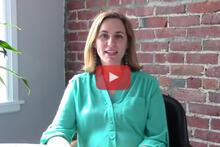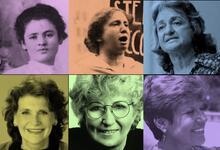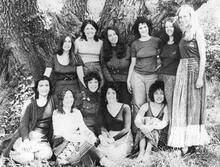Rose Kushner
In 1974, journalist Rose Kushner found a lump in her breast. Contrary to accepted practice at the time, she fought to receive the biopsy results herself, rather than allowing the doctor to perform a mastectomy while she was still under anesthesia from the biopsy. When the lump was confirmed to be malignant, Kushner chose a modified radical mastectomy, rather than the more extensive Halstead radical mastectomy. While recovering, Kushner turned personal research into public information on breast cancer treatment, publishing a book and testifying before Congress. Persevering through a recurrence of the disease, Kushner was appointed to several national and international breast cancer advocacy organizations. She founded the National Alliance of Breast Cancer Organizations and earned numerous honors for her courageous work, including the American Cancer Society’s Medal of Honor.
With a self-described “streak of stubbornness, and a loud voice as well,” Rose Kushner—journalist, activist, and patient advocate—raised American national consciousness on breast cancer and helped create a national movement around the issue.
Early life, education, and marriage
Born on June 22, 1929, in East Baltimore, MD, Rose Kushner was the fourth and last child of Israel and Fannie Rehert. Her parents, both Eastern European immigrants, died by the time she was ten, and Rose went to live in the house of her aunt Golde. She was raised speaking Yiddish at home and attended Hebrew School as well as classes at the Workmen’s Circle. Rose was an eager, bright student and hoped to attend college and ultimately become a physician, but since her older brothers were not willing to pay for her tuition, she went to work after graduating from high school. After briefly holding several office jobs, she became the assistant to animal behaviorist Dr. Horsley Gantt (1892–1980) at the Pavlovian Laboratory of Johns Hopkins Medical School, where she worked from 1947 until 1951. During this time, Rose took evening pre-medical courses at Baltimore Junior College and, encouraged by Dr. Gantt, discovered her talent for writing. She also took a year’s leave from her job to work with World Wwar II refugees in Europe.
In 1951, Rose married Harvey Kushner (1930-2017), an engineer and management consultant. Together they had three children: Gantt (1952), Todd (1956), and Lesley (1958). While raising their children, Kushner continued pursuing higher education at Montgomery Junior College and the University of Maryland, from which she earned a degree in journalism with honors in 1972. She also worked as a writer and editor, covering science and medical topics as well as the Vietnam War, for which she served as a Baltimore Sun correspondent in 1967, and the Yom Kippur War. She wrote an unpublished book entitled “The Peacehawks” on the Vietnam War, as well as an unpublished memoir, “I Wasn’t Raised to be a Jewish Mother.”
Breast cancer research: personal made public
When she found a lump in her breast in June 1974, Kushner used her journalism skills to help her deal with her illness. Taking advantage of her proximity to the National Library of Medicine, the National Institutes of Health, and the National Cancer Institute, Kushner educated herself about breast cancer and its treatment. Based on her research, Kushner determined that she did not want to have the standard one-step biopsy and mastectomy, in which the breast lump is biopsied and, if the frozen-section pathological report indicates malignancy, a mastectomy is immediately performed without consultation with the patient, who remains under anesthesia while the decision is made. Kushner insisted that she wanted to receive the results of her biopsy and then make decisions about her treatment in consultation with specialists. Although this request now hardly sounds radical, in 1974 Kushner had a difficult time finding a surgeon who would agree to her terms; nineteen surgeons turned her down when she demanded they sign a contract stipulating they would perform the biopsy but were forbidden to remove her breast. When the biopsy confirmed that her lump was malignant breast cancer, Kushner decided that she wanted a modified radical mastectomy, rather than the standard Halstead radical mastectomy, in which the pectoralis muscles and lymph nodes are removed together with the breast. She traveled to the Roswell Park Memorial Institute in Buffalo, NY, to obtain the procedure that she desired.
During her recuperation, Kushner began to transform her personal tragedy into a professional calling. Realizing that not all women with breast cancer had access to the resources she did, she turned the information she had gathered for her own edification into articles about breast cancer and the controversies—not well publicized at the time—surrounding its treatment. She also traveled to England, Scotland, Scandinavia, and Russia to study their breast cancer treatments, discovering that European doctors were far more critical of the Halstead radical mastectomy than doctors in America, who touted it as the most successful surgical treatment. Kushner compiled her research in Breast Cancer: A Personal History and Investigative Report, which she first published in 1975, and then revised and republished as Why Me? (1977) and Alternatives (1984). She explained that “the point of this book is to show that we women should be free, knowledgeable, and completely conscious when the time comes for a decision, so that we can make it for ourselves. Our lives are at stake, not a surgeon’s.”
With the publication of her book, Kushner became a leading public educator on breast cancer. In response to the flood of mail she received from women desperate to receive information on breast cancer and its treatment—letters sometimes addressed only to “Mrs. Breast Cancer, Kensington, MD”—Kushner founded a non-profit referral and information service, the Breast Cancer Advisory Center (BCAC), in 1975. The BCAC offered a hotline (until 1982) and sent out fact sheets on a range of breast cancer related topics to those who contacted them.
A leading voice in breast cancer activism
Kushner was considered an authority on breast cancer not only by women seeking information on the disease. She was also called to testify before Congress on numerous health and cancer topics, including breast cancer, radiation health and safety, the National Cancer Institutes’ public-education programs, and insurance coverage of mammograms and pap smears. In May 1976, Rose Kushner was the first person to testify before the Senate subcommittee on health regarding breast cancer, advocating the two-step biopsy procedure, the replacement of the Halstead radical mastectomy as standard treatment with the modified radical mastectomy, and the need for more clinical trials and more surgeons trained as breast specialists. She also raised the possible link between breast cancer and hormone therapies, such as oral contraceptives and DES (diethylstilbestrol). Kushner played an important role in making breast cancer a political issue, pushing for various federal and state bills that would: give women a choice between a one-step and a two-step biopsy (the Breast Cancer Patients’ Bill of Rights), mandate that physicians disclose all treatment options to patients with breast cancer (the Informed Decision Law), offer coverage of annual mammography by Medicare, regulate the use of radiation in mammograms, include the risk of breast cancer in the patient warning for oral contraceptives, and make more money available for breast cancer research. In June 1977, Kushner was the only non-physician appointed to an NIH panel, which adopted her recommendation to make the two-stage biopsy standard procedure. Her work also played an important role in changing the accepted protocol from the Halstead radical mastectomy to the modified radical.
In addition to addressing the medical and political aspects of breast cancer and its treatment, Kushner also struggled with the psychological impact of breast cancer. While she asserted that women’s primary concern in pursuing treatment should be their survival, she acknowledged the powerful psychological importance of breasts in women’s lives. In 1978, Kushner decided to undergo breast reconstruction surgery with a saline implant. Pleased with the results, which she believed gave her increased confidence, she became an advocate for breast reconstruction (and remained one even after her implant ruptured and had to be replaced).
Organizations and honors
In June 1982, Kushner discovered a recurrence of her cancer in the skin over the site of her mastectomy. She refused aggressive chemotherapy and was treated with tamoxifen. Despite the return of her illness, Kushner continued to devote herself to breast cancer activism, crusading against aggressive adjuvant chemotherapy, which she rejected as “the Halstead Radical of the 1980s.” She also was appointed by President Carter to the National Cancer Advisory Board, a position which she held from 1980 to 1986. In 1984, Rose traveled to China with a grant from the International Union Against Cancer, and reported on the increase in incidence of breast cancer there. In 1986, Kushner helped found the National Alliance of Breast Cancer Organizations—a national umbrella organization—and served on its board from 1986 to 1989. The American Cancer Society appointed Kushner to its Breast Cancer Task Force in 1989. She also participated in studies of silicone breast implants and of women who had taken DES during pregnancy, as she herself had.
Kushner asserted that “I consider everything I do social work,” and her significant contributions to society were repeatedly acknowledged. She received two awards (in 1980 and 1985) from the American Medical Writers Association on her breast cancer reporting. The American Cancer Society awarded her the Medal of Honor in 1987 and the Courage Award in 1988. In 1990, the Society of Surgical Oncology gave her the James Ewing Award for outstanding contributions by a layperson in the fight against cancer. This award in particular illustrated the significant changes that Kushner provoked in the field of breast cancer treatment, since members of the Society of Surgical Oncology had booed her in 1975 when she challenged their standard treatments.
Despite her fierce will and determined activism on behalf of breast cancer patients, Rose Kushner died of the disease on January 7, 1990. Her loud voice continues to echo in the work of breast cancer activists.
Selected works by Rose Kushner
Breast Cancer: A Personal History and Investigative Report (1975).
Why Me? (1977).
Alternatives (1984).
Kushner, Rose. Papers, Schlesinger Library, Radcliffe College, Cambridge, MA.
Lerner, Barron, The Breast Cancer Wars: Hope, Fear, and the Pursuit of a Cure in Twentieth-Century America. New York: 2001.
Obituary, New York Times, January 10, 1990, B:5.
Obituary, Washington Post, January 9, 1990, B:4.






